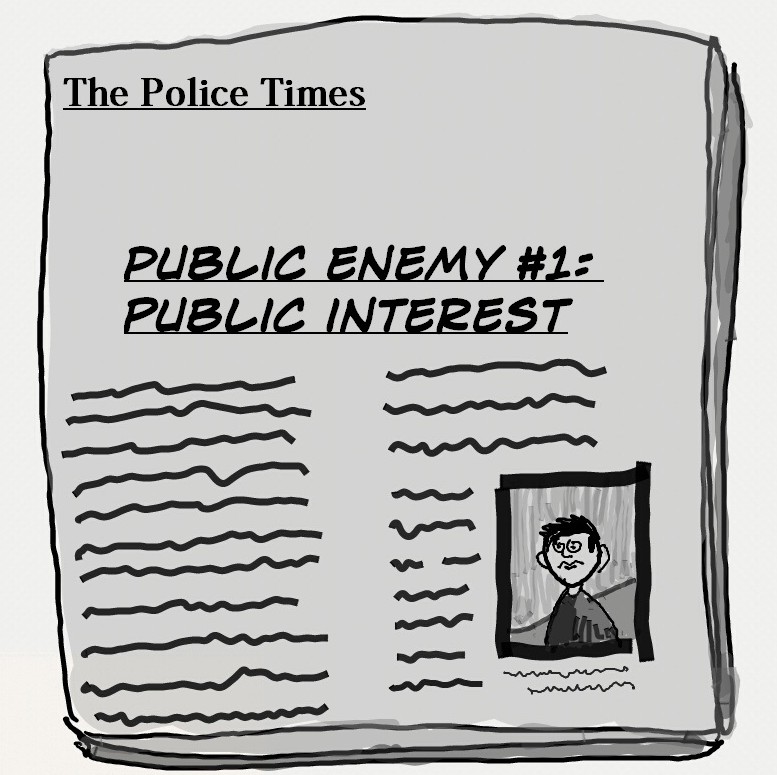
Equipped with a search warrant, the Sûreté du Québec raided the home of Journal de Montreal journalist Eric Yvan Lemay on March 15.
They wanted access to his computer, some clothes and presumably his fingerprints. Lemay has not been charged, but the Journal de Montreal indicated in a Huffington Post article that he is suspected of theft under $5,000 and trafficking of confidential documents.
Lemay is an investigative reporter who exposed how easy it can be to gain access to private patient files at hospitals in and around Montreal. In one instance, he found files in a hospital corridor and videotaped himself leafing through them. The Journal de Montreal then published excerpts of those documents, with the patient names blacked out. They defended their actions by claiming it was in the public’s interest to know how readily available their confidential information was. The newspaper also said that Lemay never stole any documents.
As soon as news of the raid broke, the Canadian Association of Journalists, the Federation professionnelle des journalistes du Quebec and many media outlets publicly denounced the purported intimidation tactics carried out by the SQ.
“The SQ seeks to uncover, frighten and dry up the sources of investigative journalists that it wouldn’t otherwise look into,” said FPJQ President Brian Myles in a statement on the federation’s website.
But hold on a second. Before we go and accuse the SQ of intimidation, or claim that they “shot the messenger,” we need all the facts.
Under normal circumstances, this Soviet-style, draconian intrusion would easily constitute a breach of freedom of press. It would seem as though Lemay was just doing his job, reporting on what may very well be a distinct flaw in the health care system and bringing information to the public about a gross oversight hospitals have been avoiding.
However, two days after Lemay’s home was raided, Le Devoir published an article stating that three separate sources had confirmed that video surveillance footage existed showing Lemay going into an operating room and an office and exiting with documents.
I don’t have a stance on whether Lemay is a victim or whether he broke the law or not, but I do know that it’s important to wait until all the evidence has been presented before passing judgement, including this mysterious footage that has yet to surface. The SQ also needs to go into greater detail and explain why there were grounds to put Lemay and his wife under surveillance for seven days between Feb. 25 and March 12.
Hugo Rodrigues, president of the Canadian Association of Journalists, agrees.
“The SQ said they had a valid reason to put Lemay under surveillance but we need disclosure,” he said. “If there’s footage of him at the hospital breaking into an office, fine, release it but give him the same opportunity to defend himself as you would give anyone else who is under suspicion.”
Rodrigues and the CAJ want the public to know that we’re missing the point amid this mediatic circus.
“Lemay was doing his job by bringing to light information that was in the public’s interest,” he explained. “Our focus is being misdirected. Is there credible information to suggest a law has been broken and that there was criminal intent? In the lack of that, we’ll take the Journal de Montreal at its word.”
It’s important to hold governments accountable for their actions and investigative reporters here in Quebec such as Lemay had a duty to bring these actions to light. We have one of the worst health care systems in Canada and our hospitals are rife with inadequacies. But, until we know absolutely everything there is to know about Lemay’s case, it’s unwise to sit on one side of the fence.
Aaron Derfel, journalism professor at Concordia University and medical reporter at The Gazette, also believes this case isn’t as black and white as we may think.
“This isn’t a clear cut case where it’s been proven beyond any doubt that the police overstepped their bounds,” he said. “They do what they have to do. If they receive a complaint, they have to look into it. But I’m still troubled when the SQ can obtain a search warrant to enter the house of a fellow journalist.”
Whenever journalists carry out these practices—they investigate, they expose—they run the risk of experiencing what Lemay has. There are a lot of excellent investigative reporters who do their work accurately and take great lengths to stay within the boundaries of the law. It’s important to have a strong press and not let these laxes of security slip, Derfel said.
“I would normally support my colleagues but we still need to know more information,” said Derfel.




